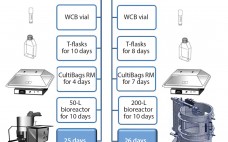Follicle-stimulating hormone (FSH) is a heterodimeric glycoprotein consisting of noncovalently linked α and β subunits. It stimulates the growth of immature follicles in ovaries and primary spermatocytes in testes and thus plays an important role in human reproduction (1). Human menopausal gonadotropin for infertility treatment was first introduced into clinical practice in 1950 (2, 3). Subsequently, treatments with urinary FSH have been replaced by recombinant human FSH (rh-FSH), which has been shown to provide several advantages such as absence of…
Author Archives: Jan Rohde, PhD
Increasing Purity and Yield in Biosimilar Production
Current downstream processing strategies for recombinant proteins often require multiple chromatographic steps, which may lead to poor overall yields. Product purification can be especially difficult when a target protein displays reduced stability, forms isoforms or misprocessed variants, or needs to be purified from a complex mixture containing a high degree of contaminants. One technology that has been developed to tackle such limitations is based on custom-made chromatography matrices containing camelid-based single-domain antibody fragments. With a molecular weight of only 12–15…

